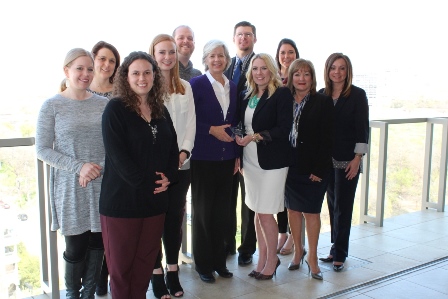Alzheimer’s, the most common dementia diagnosis, causes changes that tend to occur gradually. This can make it difficult for a family member, significant others or caregivers to determine when a person with dementia needs a higher level of care.
Caring for someone with a dementia diagnosis can be a rewarding and challenging experience. It can bring you closer to a loved one, but may also cause stress and even burnout. At some point it may be better for your loved one to move to a memory community that can better serve their needs. But how do you determine when it’s the right time to transition a loved one to memory care?
What Is Memory Care?
Memory care is a specialized form of residential care that offers full-time support for older adults with a dementia diagnosis. The best memory care communities are designed in a way that accommodates the unique needs of someone with dementia.
Some senior living communities, such as The Stayton at Museum Way in Fort Worth, Texas, offer memory care as part of their full continuum of senior health services. Our community even introduced the memory care household model — a person-centered approach — to the city.
In the event you or a loved one receive a diagnosis of Alzheimer’s or another form of dementia, it’s ideal to have a plan in place for the future. A memory care community can help someone with dementia live life to its fullest.
Signs It Might Be Time for Memory Care
While cognitive decline in someone diagnosed with Alzheimer’s or another form of dementia tends to be gradual, there are signs to look out for that signal its time for specialized care.
Inability to Complete Activities of Daily Living
Activities of daily living (ADLs) include actions such as dressing, bathing and using the bathroom. While a caregiver can help someone with dementia perform these activities, eventually there will become a time when you may feel overwhelmed by the level of assistance required. When you choose a memory care community, the team there provides 24-hour support for your loved one.
Aggressive Behavior or Intense Mood Swings
As their condition advances, a loved one may begin to experience what seems like a dramatic change in personality. Intense and sudden mood swings are not uncommon. Memory care professionals receive training on how to best deal with shifts in mood to provide compassionate care.
Wandering That Becomes Dangerous
Alzheimer’s disease and other dementias eventually cause individuals to lose their ability to recognize familiar people and places. According to the Alzheimer’s Association, six in 10 people living with dementia will wander at least once, and many do so repeatedly. When wandering becomes a danger to a loved one it may be time to seek a higher level of care.
Caregiver Physical or Mental Health Declines
The Cleveland Clinic defines caregiver burnout as “a state of physical, emotional and mental exhaustion.” This is a real medical condition that impacts caregivers. This condition is common among family members and loved ones who provide care for an older adult with dementia. You should aim to seek outside help if you even think you are beginning to feel burned out.
Explore Memory Care at The Stayton
The Stayton at Museum Way has a compassionate team of memory care experts who work with residents and their families to create a sense of routine that fosters well-being. This comfortable environment encourages residents living with dementia to feel more relaxed and connected.
Some of the memory care services we provide to residents include:
- Spacious private residences in a secure setting
- 24-hour supervised care in a customized environment
- Common spaces designed to encourage socialization
- Three nutritious chef-prepared meals provided daily
We also provide special programming like MUSIC & MEMORY® curated playlists and It’s Never 2 Late (iN2L) technology and programming to stimulate the mind and tap into heartfelt memories.
Whether you are a caregiver of someone with dementia in the Fort Worth area or just looking to give your loved ones peace of mind in the event you receive a dementia diagnosis, the team at The Stayton at Museum Way are always available to speak with you about your options.



